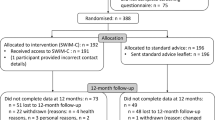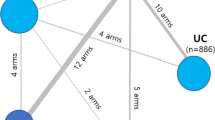Abstract
This study examined the effectiveness of the manual for obesity Perdere peso senza perdere la testa (Losing weight without losing your mind) used in form of guided self-help on 161 patients. Three levels of treatments were compared: (a) guided self-help treatment (GSH); (b) minimal guided self-help treatment (M-GSH); (c) control condition (CC). At the end of the treatment, a significant reduction in body weight was observed in GSH and MGSH, but not in the CC. At six-month follow-up 32.7% of GSH subjects and 15.1% of M-GSH subjects were able to maintain at least a 5% weight loss. The findings show that GSH is more effective than M-GSH in determining a significant short-term reduction of body weight.
Similar content being viewed by others
References
Hodge A.M., Zimmet P.Z.: The epidemiology of obesity. Baillieres Clin. Endocrinol. Metab., 8, 577–599, 1994.
Sejdell J.C.: The worldwide epidemic of obesity. 8th International Congress on Obesity. In: Guy-Grand B., Ailhaud G. (Eds.), Progress in obesity research. London, John Libbey, 1999, pp. 661–668.
Flegal K.M,. Carroll M.D., Ogden C.L., Johnson C.L.: Prevalence and trends in obesity among US adults, 1999–2000. JAMA, 288, 1723–1727, 2002.
Björntorp P.: Obesity. Lancet, 350, 423–426, 1997.
National Heart, Lung and Blood Institute; National Institute of Health. Clinical Guidelines on the Identification, Evaluation and Treatment of Overweight and Obesity in Adults — The Evidence Report, 1998.
Wadden T.A., Anderson D.A., Foster G.D.: Two-year changes in lipids and lipoproteins associated with the maintenance of a 5% to 10% reduction in initial weight: some findings and some questions. Obes. Res., 7, 170–178, 1999.
Institute of Medicine. Weighing the Options: Criteria for Evaluating Weight-Management Programs. Washington, D.C., National Academy Press, 1995.
Wing R.R.: Behavioral approaches to the treatment of obesity. In: Bray G.A., Bouchard C. (Eds.), Handbook of Obesity. New York, Marcel Dekker, 1998, pp. 855–873.
Wilson G.T., Brownell K.D.: Behavioral treatment for obesity. In: Fairburn C.G., Brownell K.D. (Eds.), Eating Disorders and Obesity. New York, Guilford, 2002, pp. 524–528.
Fairburn G.C., Carter J.C.: Self-help and guided self-help for binge-eating problems. In: Garner D.M., Garfinkel P.E. (Eds.), Handbook of Treatment for Eating Disorders. New York, Guilford Press, 1997, pp. 494–499.
Carter J.C., Fairburn C.G.: Cognitive-behavioral selfhelp for binge eating disorder: A controlled effectiveness study. J. Consult. Clin. Psychol., 66, 616–623, 1998.
Marcus M.D.: Binge eating and obesity. In: Brownell K.D., Fairburn C.G. (Eds.), Eating Disorders and Obesity: A Comprehensive Handbook. New York, Guilford, 1995, pp. 441–444.
Latner J.D., Wilson G.T., Stunkard A.J., Jackson M.L.: Self-help and long-term behavior therapy for obesity. Behav. Res. Ther., 40, 805–812, 2002.
Latner J.D.: Self-help in the long-term treatment of obesity. Obes. Rev., 2, 87–97, 2001.
Dalle Grave R.: Perdere peso senza perdere la testa. Verona, Positive Press, 1999.
Sackett D.L., Gent M.: Controversy in counting and attributing events in clinical trials. N. Engl. J. Med., 301, 1410–1412, 1979.
Wilson G.T.: Acceptance and change in the treatment of eating disorders and obesity. Behav. Ther. 27, 417–439, 1996.
Fairburn C.G., Beglin S.J.: Assessment of eating disorders: interview or self-report questionnaire? Int. J. Eat. Disord., 16, 363–370, 1994.
Rosenberg M.: Society and adolescent self-image. Princeton, Princeton University Press, 1965.
Ware J.E. Jr, Snow K.K., Kosinski M., Gandek B.: SF-36 Health Survey: Manual and Interpretation Guide. Boston, Mass, The Health Institute, New England Medical Center, 1993.
Apolone G., Mosconi P., Ware J.E.: Questionario sullo stato di salute SF-36. Manuale d’uso e guida all’interpretazione dei risultati. Milano, Guerini e Associati, 1997.
Miller W.C., Eggert K.E., Wallace J.P., Lindeman A.K., Jastremski C.: Successful weight loss in a self-taught, self-administered program. Int. J. Sports Med., 14, 401–405, 1993.
Klem M.L., Klesges R.C.: Competition in a minimalcontact weight-loss program. J. Consult. Clin. Psychol., 56, 142–144, 1998.
Sjörstrom L., Rissanen A., Andersen T., Boldrin M., Golay A., Koppeschaar A.P.F., Krempf M. for the European Multicentre Orlistat Study Group. Randomised placebo-controlled trial of orlistat for weight loss and prevention of weight regain in obese patients. Lancet, 352, 167–172, 1998.
Author information
Authors and Affiliations
Corresponding author
Rights and permissions
About this article
Cite this article
Dalle Grave, R., Todesco, T., Banderali, A. et al. Cognitive-behavioural guided self-help for obesity: A preliminary research. Eat Weight Disord 9, 69–76 (2004). https://doi.org/10.1007/BF03325048
Published:
Issue Date:
DOI: https://doi.org/10.1007/BF03325048




